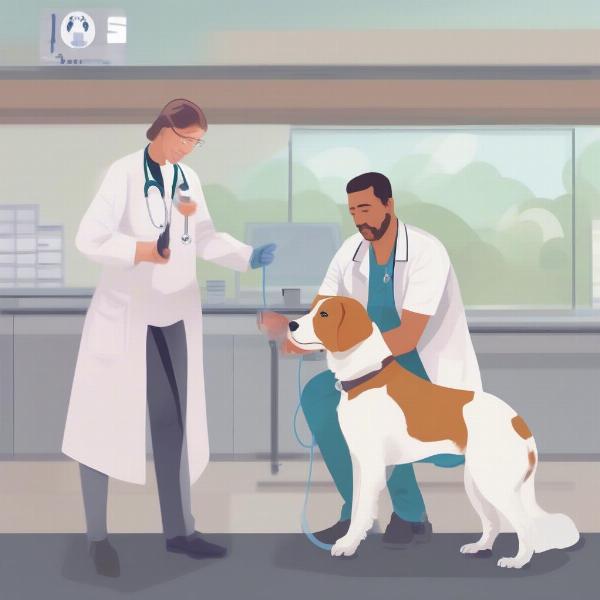The L4 dog vaccine, also known as the leptospirosis vaccine, protects dogs against four serovars of the Leptospira bacteria. This crucial vaccine safeguards your canine companion from a serious bacterial infection that can cause severe illness and even be fatal. Understanding the importance, administration, and potential side effects of the L4 vaccine is essential for responsible dog ownership.
What is Leptospirosis and Why is the L4 Vaccine Important?
Leptospirosis is a zoonotic disease, meaning it can be transmitted between animals and humans. Dogs can contract leptospirosis through contact with contaminated water, soil, or urine from infected animals, particularly rodents. The L4 vaccine protects against four of the most common serovars of Leptospira, significantly reducing the risk of infection. Without vaccination, dogs are vulnerable to this potentially life-threatening disease.
 L4 dog vaccine protecting a dog from leptospirosis
L4 dog vaccine protecting a dog from leptospirosis
Symptoms of leptospirosis can range from mild to severe, including fever, lethargy, vomiting, jaundice, kidney and liver failure, and even death. Early diagnosis and treatment are crucial for a positive outcome. Preventing the disease through vaccination is the best approach to safeguarding your dog’s health.
Administering the L4 Dog Vaccine
The L4 vaccine is typically given as a series of two injections, administered 2-4 weeks apart, starting around 12 weeks of age. Booster shots are then required annually or every three years, depending on your veterinarian’s recommendation and your dog’s risk factors. 9 way dog vaccine often includes the L4 component.
Potential Side Effects of the L4 Vaccine
Like any vaccine, the L4 vaccine can cause some side effects, although they are usually mild and temporary. These may include:
- Swelling or pain at the injection site
- Mild fever
- Lethargy
- Decreased appetite
In rare cases, more serious allergic reactions can occur. If your dog experiences any unusual symptoms after vaccination, contact your veterinarian immediately.
Is the L4 Vaccine Right for Your Dog?
While the L4 vaccine is generally recommended for most dogs, your veterinarian can assess your dog’s individual risk factors based on their lifestyle, environment, and geographic location. For example, dogs who spend time outdoors, swim in lakes or ponds, or live in areas with high rodent populations are at greater risk of exposure to leptospirosis.
Protecting Your Dog from Leptospirosis: Beyond the Vaccine
While the L4 vaccine offers significant protection, it’s essential to take additional precautions:
- Avoid stagnant water sources
- Control rodent populations around your home and yard
- Practice good hygiene, especially after handling your dog’s urine
Conclusion
The L4 dog vaccine is a vital part of preventative healthcare for dogs, protecting them against the potentially devastating effects of leptospirosis. By understanding the importance of this vaccine and discussing it with your veterinarian, you can make informed decisions to protect your furry friend’s health. seven way dog vaccine might be an option as well. Discuss with your vet.
FAQ
- When should my puppy receive the L4 vaccine? Typically around 12 weeks of age, followed by a booster 2-4 weeks later.
- How often does my dog need the L4 booster? Annually or every three years, depending on your veterinarian’s recommendation and your dog’s risk factors.
- What are the common side effects of the L4 vaccine? Mild and temporary side effects may include swelling at the injection site, mild fever, lethargy, and decreased appetite.
- Is the L4 vaccine safe for all dogs? While generally safe, your veterinarian should assess your dog’s individual risk factors to determine if the vaccine is appropriate.
- What can I do to further protect my dog from leptospirosis? Avoid stagnant water sources, control rodent populations, and practice good hygiene.
- Can humans get leptospirosis from dogs? Yes, leptospirosis is a zoonotic disease, meaning it can be transmitted between animals and humans. 10 way vaccine for dogs covers other important diseases.
- What should I do if my dog shows unusual symptoms after vaccination? Contact your veterinarian immediately. 9 way vaccine for dogs or 10 way shot for dogs might also offer protection.
ILM Dog is a leading international pet website dedicated to providing dog owners with expert advice on all aspects of dog care and well-being. From breed selection and health to training and nutrition, ILM Dog offers reliable, practical information to help you provide the best possible care for your canine companion. Our expert team covers a range of topics, including puppy and senior dog care, exercise and activities, grooming, travel tips, and product recommendations. Contact us today for personalized advice: Email: [email protected], Phone: +44 20-3965-8624.